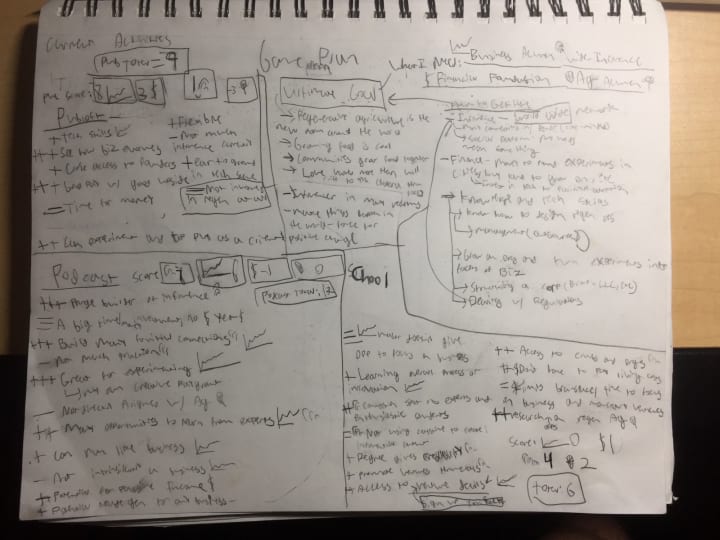Refresh Button Pt. 1: Creating a Strategic System to Reach My Long-Term Goals
The useful system I discovered for weighing new projects through taking a social media break.

After a conversation with Nico De Bruyn where he opened my eyes to all the amazing entrepreneurial opportunities in existence, I realized I needed to take a bit to really step back and strategically plan my next few ventures. Having my head in the weeds, while fun and rewarding, was starting to feel like a bit of a treadmill.
So, I decided to clear some brainpower for the week by going ghost on social media. I was very pleased with the results, and this activity is something I want to continue doing once every two to three months.
It all started with…
Being strategic with my direction.
I normally just accept opportunities intuitively — I didn’t have a strategic plan laid out. I would get offered an amazing opportunity, like witnessing Tanner German masterfully build out an agency while leveraging only one to two active employees, or Jérémy Chevallier and Mat Sherman getting resourceful with the WATZ stack. And I would just run with it. Head down. But after a little while, it started to feel like I was becoming a professional project juggler.
With my head down I felt I was starting to get off-track from more long-term goals. I wanted to make sure that wasn’t happening. So I mapped out my ultimate goal, which is:
Creating a world where regenerative agriculture is the new norm, and people find social connection through a refreshed perspective on what it means to eat and grow food.
Feel free to reach out to me if that’s your goal too :)
Your goal doesn’t have to take the form of a couple sentences. If it’s less certain for you, then simply create a word cloud, or maybe even an illustration with a small description.
The formula
I figured I’d need to understand exactly what I need to get there. So I opened my sketchpad, thought about the skills I’d need to create my vision, and went to work.
I came up with four basic categories — a high ranking means the venture empowers me to answer “yes” to the associated questions:
💰 Financial foundation
- This delineates the “runway” I have in my bank account.
- Can I go a few years without income, and have extra to invest in a business?
☘️Regenerative agricultural acumen
- Can I identify use cases for different regenerative agricultural methods and execute on them?
📈Business acumen
- Can I create, optimize, and run businesses in a variety of industries?
🗣Social influence and a platform.
- Do the words I say/write/post matter to people? Does my message drive widespread and significant action?
Knowing my ultimate goal and these skill categories were one of the most crucial aspect of this whole exercise.
You need to know what you want, and have a rough idea of how you’re going to get there.
I then mapped out my current projects, and scored them based on how they would add to each of the four skill categories. This is the result (warning: it’s not pretty 😆)

I write like a second grader. This was fun as shit though.
So there’s the craziness inside my brain. But, I also want you to understand how I mapped things out. Click the link for a more digest-able way of viewing everything in Airtable.
Let’s use an example project to go through this process… Say PubLoft
I asked my self questions for each category–
- What are the positive and negative effects of Publoft on my financial foundation?
- What are the positive and negative effects of Publoft on my influence and platform?
- What are the positive and negative effects of Publoft on my business acumen and technical knowledge?
- What are the positive and negative effects of Publoft on my regenerative agriculture knowledge ?
- How much time, effort, and complexity is involved to execute on working for Publoft?
I came up with a few pros and cons for each skill category, and weighed it by significance. Then I subtracted the complexity from the total. The formula for scoring each venture looked like this:
Venture Score = Business Acumen + Financial Foundation + Regen Ag skills + Influence — Complexity
From this, I was able to get a visual and quantified sense of how what I’m doing now helps me (or doesn’t help me) build skills and experiences that will help me reach my ultimate goal!
Moving forward with the formula
I loved this systematic way of grading ventures. Quantifying and visualizing really helped organize my thoughts in a way I haven’t been able to before. The numbers are of course rough estimates, but they still hold usefulness for comparison. I can also refine the numbers further through more research and contemplation.
The next steps were to brainstorm a bunch of new ideas that broke me out of my current groove of thinking, then compare these ideas to my current ventures.
This process started with one of my favorite activities — brainstorming. My first out of two brainstorming sessions started with this simple question: (thank you Nico for inspiring this premise).
What’s the simplest idea, the lowest hanging fruit, that will bring me closer to my ultimate goal in the short or long term?
I spent 15–20 minutes popping out a few decent ideas that I’ll go through at the end of the article.
The second brainstorming prompt question was a bit more fun to play with:
What are radical business ideas that will change our society in a meaningful way?
These ideas were pretty high in the complexity score 😜
Each brainstorming session yielded 20–30 ideas, as sometimes I would get sucked in to a single idea in the middle of the session instead of staying on the surface.
I then screened these ideas and discarded those that simply wouldn’t work, or that don’t align with the skills I have or want to develop.
I was left with a few ideas I now plan to execute on or revisit in a few months or years:
- Digital and personal brand consulting.
- Creation of a weekly hiking group with friends where we hold discussions of what’s working in life, what’s not, and generally listening to each other.
- A company that pays people to bring their food waste to a processing center, and sells the compost to commercial farmers.
- A digital crowdfunding and agricultural project platform for communities to buy unused land on which to start urban gardens.
- Sell people’s old phones for them, and take a little money off the top.
- Create an automated e-commerce platform for Applying Awareness merch.
- Creating a podcasting class on skillshare.
These ideas are unrelated, and range from trivial to large investments. Some of them I plan to roll out in the near future, while I will work on others in the background, conducting further foundational research.
From there, I came up with a plan of action for each idea, and scheduled when to revisit it! Either a week or a couple years from now, it’s in my calendar.
And something has to be in my calendar if I’m to complete it. 😉
Wrapping up
Although this was my process for creating a long term strategy, it probably won’t be yours. Think of it as a starting point, but bend (or break and remake) it to fit your unique circumstances. Essentially, you need to scope out your ultimate goal, what you need to get there, and how to create circumstances where you gain what you need to reach that goal.
That was part one of my self-reflection journey! I wanted to focus on more macro level items at first to set the stage for part two — processes that I go through in my day-to-day.
I hope you enjoyed the article — please reach out or comment if you have any thoughts or suggestions. I love starting discussions, that’s a big reason why I create content!
If you enjoyed this content, you might like my podcast, Applying Awareness — it’s about learning about the cause and effect within ourselves and our society, and leveraging the awareness of the causes and effects to drive positive change.
Did you enjoy this article? You might enjoy my podcast and my social media content on Instagram, LinkedIn, Twitter, and Facebook.
About the Creator
Adam French
I'm also passionate about using awareness for self and societal improvement - I like to dig into the fields of design, psychology, personal development, and agriculture to find ways to guide people towards their best selves






Comments
There are no comments for this story
Be the first to respond and start the conversation.